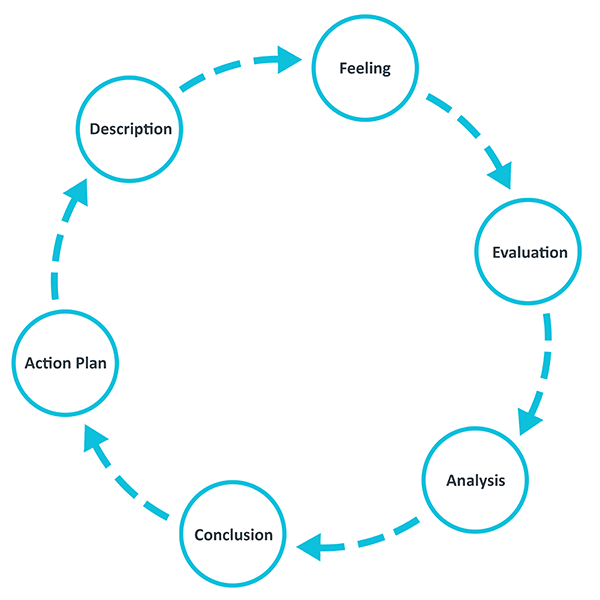Get Essay Help service on Gibbs Reflective Cycle
Gibbs' reflective cycle
Gibbs’ reflective cycle is arguably one of the most famous models of reflection leading you through different stages to make sense of an experience.
Overview
Gibbs' Reflective Cycle was developed by Graham Gibbs in 1988 to give structure to learning from experiences. It offers a framework for examining experiences, and given its cyclic nature lends itself particularly well to repeated experiences, allowing you to learn and plan from things that either went well or didn’t go well. It covers 6 stages:
- Description of the experience
- Feelings and thoughts about the experience
- Evaluation of the experience, both good and bad
- Analysis to make sense of the situation
- Conclusion about what you learned and what you could have done differently
- Action plan for how you would deal with similar situations in the future, or general changes you might find appropriate.
Below is further information on:
- The model – each stage is given a fuller description, guiding questions to ask yourself and an example of how this might look in a reflection
- Different depths of reflection – an example of reflecting more briefly using this model
This is just one model of reflection. Test it out and see how it works for you. If you find that only a few of the questions are helpful for you, focus on those. However, by thinking about each stage you are more likely to engage critically with your learning experience.
The model

This model is a good way to work through an experience. This can be either a stand-alone experience or a situation you go through frequently, for example meetings with a team you have to collaborate with. Gibbs originally advocated its use in repeated situations, but the stages and principles apply equally well for single experiences too. If done with a stand-alone experience, the action plan may become more general and look at how you can apply your conclusions in the future.
For each of the stages of the model a number of helpful questions are outlined below. You don’t have to answer all of them but they can guide you about what sort of things make sense to include in that stage. You might have other prompts that work better for you.
Description
Here you have a chance to describe the situation in detail. The main points to include here concern what happened. Your feelings and conclusions will come later.
Helpful questions:
- What happened?
- When and where did it happen?
- Who was present?
- What did you and the other people do?
- What was the outcome of the situation?
- Why were you there?
- What did you want to happen?
Example of 'Description'
| Group work assignment |
| For an assessed written group-work assignment, my group (3 others from my course) and I decided to divide the different sections between us so that we only had to research one element each. We expected we could just piece the assignment together in the afternoon the day before the deadline, meaning that we didn’t have to schedule time to sit and write it together. However, when we sat down it was clear the sections weren’t written in the same writing style. We therefore had to rewrite most of the assignment to make it a coherent piece of work. We had given ourselves enough time before the deadline to individually write our own sections, however we did not plan a great deal of time to rewrite if something were to go wrong. Therefore, two members of the group had to drop their plans that evening so the assignment would be finished in time for the deadline. |
Feelings
Here you can explore any feelings or thoughts that you had during the experience and how they may have impacted the experience.
Helpful questions:
- What were you feeling during the situation?
- What were you feeling before and after the situation?
- What do you think other people were feeling about the situation?
- What do you think other people feel about the situation now?
- What were you thinking during the situation?
- What do you think about the situation now?
Example of 'Feelings'
| Group work assignment |
| Before we came together and realised we still had a lot of work to do, I was quite happy and thought we had been smart when we divided the work between us. When we realised we couldn’t hand in the assignment like it was, I got quite frustrated. I was certain it was going to work, and therefore I had little motivation to actually do the rewriting. Given that a couple of people from the group had to cancel their plans I ended up feeling quite guilty, which actually helped me to work harder in the evening and get the work done faster. Looking back, I’m feeling satisfied that we decided to put in the work. |
Evaluation
Here you have a chance to evaluate what worked and what didn’t work in the situation. Try to be as objective and honest as possible. To get the most out of your reflection focus on both the positive and the negative aspects of the situation, even if it was primarily one or the other.
Helpful questions:
- What was good and bad about the experience?
- What went well?
- What didn’t go so well?
- What did you and other people contribute to the situation (positively or negatively)?
Example of 'Evaluation'
| Group work assignment |
| The things that were good and worked well was the fact that each group member produced good quality work for the agreed deadline. Moreover, the fact that two people from the group cancelled plans motivated us to work harder in the evening. That contributed positively to the group’s work ethic. The things that clearly didn’t work was that we assumed we wrote in the same way, and therefore the overall time plan of the group failed. |
Analysis
The analysis step is where you have a chance to make sense of what happened. Up until now you have focused on details around what happened in the situation. Now you have a chance to extract meaning from it. You want to target the different aspects that went well or poorly and ask yourself why. If you are looking to include academic literature, this is the natural place to include it.
Helpful questions:
- Why did things go well?
- Why didn’t it go well?
- What sense can I make of the situation?
- What knowledge – my own or others (for example academic literature) can help me understand the situation?
Example of 'Analysis'
| Group work assignment |
I think the reason that our initial division of work went well was because each person had a say in what part of the assignment they wanted to work on, and we divided according to people’s self-identified strengths. I have experienced working this way before and discovered when I’m working by myself I enjoy working in areas that match my strengths. It seems natural to me that this is also the case in groups. I think we thought that this approach would save us time when piecing together the sections in the end, and therefore we didn’t think it through. In reality, it ended up costing us far more time than expected and we also had to stress and rush through the rewrite. I think the fact we hadn’t planned how we were writing and structuring the sections led us to this situation. I searched through some literature on group work and found two things that help me understand the situation. Belbin’s (e.g. 2010) team roles suggests that each person has certain strengths and weaknesses they bring to a group. While we didn’t think about our team members in the same way Belbin does, effective team work and work delegation seems to come from using people’s different strengths, which we did. Another theory that might help explain why we didn’t predict the plan wouldn’t work is ‘Groupthink’ (e.g. Janis, 1991). Groupthink is where people in a group won’t raise different opinions to a dominant opinion or decision, because they don’t want to seem like an outsider. I think if we had challenged our assumptions about our plan - by actually being critical, we would probably have foreseen that it wouldn’t work. Some characteristics of groupthink that were in our group were: ‘collective rationalisation’ – we kept telling each other that it would work; and probably ‘illusion of invulnerability’ – we are all good students, so of course we couldn’t do anything wrong. I think being aware of groupthink in the future will be helpful in group work, when trying to make decisions. |
Conclusions
In this section you can make conclusions about what happened. This is where you summarise your learning and highlight what changes to your actions could improve the outcome in the future. It should be a natural response to the previous sections.
Helpful questions:
- What did I learn from this situation?
- How could this have been a more positive situation for everyone involved?
- What skills do I need to develop for me to handle a situation like this better?
- What else could I have done?
Example of a 'Conclusion'
| Group work assignment |
| I learned that when a group wants to divide work, we must plan how we want each section to look and feel – having done this would likely have made it possible to put the sections together and submit without much or any rewriting. Moreover, I will continue to have people self-identify their strengths and possibly even suggest using the ‘Belbin team roles’-framework with longer projects. Lastly, I learned that we sometimes have to challenge the decisions we seem to agree on in the group to ensure that we are not agreeing just because of groupthink. |
Action plan
At this step you plan for what you would do differently in a similar or related situation in the future. It can also be extremely helpful to think about how you will help yourself to act differently – such that you don’t only plan what you will do differently, but also how you will make sure it happens. Sometimes just the realisation is enough, but other times reminders might be helpful.
Helpful questions:
- If I had to do the same thing again, what would I do differently?
- How will I develop the required skills I need?
- How can I make sure that I can act differently next time?
Example of 'Action Plan'
| Group work assignment |
| When I’m working with a group next time, I will talk to them about what strengths they have. This is easy to do and remember in a first meeting, and also potentially works as an ice-breaker if we don’t know each other well. Next, if we decide to divide work, I will insist that we plan out what we expect from it beforehand. Potentially I would suggest writing the introduction or first section together first, so that we have a reference for when we are writing our own parts. I’m confident this current experience will be enough to remind me to suggest this if anyone says we should divide up the work in the future. Lastly, I will ask if we can challenge our initial decisions so that we are confident we are making informed decisions to avoid groupthink. If I have any concerns, I will tell the group. I think by remembering I want the best result possible will make me be able to disagree even when it feels uncomfortable. |
.jpg)

Comments
Post a Comment